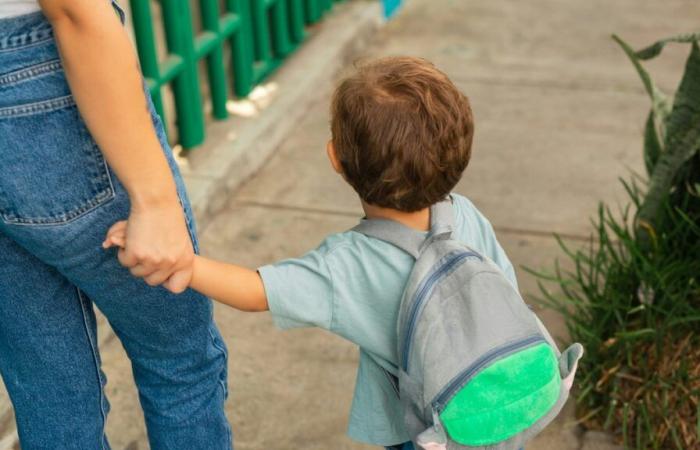Going to school with a knot in your stomach happens even to toddlers. At 5 years old, Nolan* cried every morning before joining his friends in the middle section. His parents discovered, astonished, that he was subjected to repeated teasing by two of his classmates every day. For the teaching staff at the small school where he was enrolled, managing this situation was a first. But cases like Nolan’s are becoming less and less rare.
“We are receiving more and more feedback from nursery school directors and teachers who are reporting situations of harassment.”confirms Catherine Verdier, child psychologist and founder of the Amazing Kids association, which fights against school bullying. The facts recorded in France are increasing everywhere and nursery classes are no exception.
Subscribe to Slate’s newsletter for free!Articles are selected for you, based on your interests, every day in your inbox.
“Bullying doesn’t start in middle school”
According to the e-enfance association, which fights against cyberbullying and school harassment, “harassment is defined as repeated violence that can be verbal, physical or psychological”. Daily teasing at school, even at age 5, therefore falls within this definition. “Bullying has always existed at all ages, confirms Samuel Comblez, deputy general director of the e-enfance association, director of 3018 (number for the protection of minors on the internet) and clinical psychologist. We might think that it doesn’t exist among toddlers, but yes, we can talk about harassment even among kindergarten children.”
Catherine Verdier prefers to talk about “harassment situations”. “From the age of 6-7, we can detect intentionality in the behavior of “bullying” children. It is this intentionality, this desire to hurt the other, which differentiates conflicts that can arise due to jealousy or situations of frustration in children from harassment. In very young children, is there intentionality? I don’t think so, in any case, it’s difficult to show.”
While there are no figures or studies on bullying in preschool, a 2023 survey by the Ministry of National Education showed that 5% of primary school students, from CE2 to CM2, are victims of bullying. 19% of these children are affected by “situations to be monitored”. “This means that many primary school pupils are not fulfilled and are bullied by others at school. This survey has shown that bullying does not start in middle school, but in primary school, and without a doubt, even before”continues Samuel Comblez.
This discomfort at school can have consequences for the victim’s education, their relationships with others and their socialization. “Children who are victims of bullying are not in good conditions to learn, they have problems with attention and concentration, develop fears and anxieties, particularly related to relationships with others and the group, explains Samuel Comblez. Childhood is an important but fragile time when we build our self-esteem. Daily microviolence weakens self-confidence.
Kindergarten teachers excluded
To avoid getting to this point, nursery school teachers must be able to identify bullying situations in order to stop them. However, they are not trained to manage bullying at school, unlike their colleagues who teach in elementary or middle and high schools, for whom following the program to combat bullying at school (pHARe), set up in 2021, is mandatory.
“In the pHARe program, there is no protocol for kindergarten children, which raises questions, because it suggests that the ministry considers that there is no harassment among very young children.”believes Samuel Comblez. He advocates for awareness-raising and training for all members of the schools’ teaching teams to give them the tools to act when a potential harassment situation is detected.
For psychologist Catherine Verdier, “Working on the pHARe program is good, but it lacks the prevention component, which is done from a very young age, as soon as children start school. The goal of nursery school classes is to learn to live together.”
Working on empathy and emotions
Teachers must therefore find ways to intervene at the right time and stop abusive behavior. One way for school teachers is to work from the early years on empathy and on learning the vocabulary of emotions, and thus allow children to verbalize their feelings.
“This is what we work on in our classes with our students.”confirms Maryse Chrétien, president of the General Association of Public Nursery School Teachers (AGEEM), who does not regret that primary school teachers are not involved in training on school bullying. “The pHARe program has the merit of existing, but I have seen many colleagues trained in this program who ultimately do not stay. First of all, you have to understand how children function.”
Since 2022, school bullying has been recognized as a criminal offense in French law.
AGEEM therefore regularly offers its own webinars on the subject, to train its teaching members, based on the work of researchers on child development and psychosocial skills. “As an association, we work to set up experiments and concrete actions in classes to avoid difficult situations between students. I think that our role is to support children, whether they are victims or bullies, to inform parents without making them feel guilty and to explain, to put into words what is happening. Bullying is everyone’s business.”continues Maryse Chrétien.
You don’t remain a harasser or a victim for life.
Although bullying among toddlers may seem worrisome, “It’s not because a child is bullied in kindergarten that he will be a victim of it for the rest of his life. A child can rebuild himself”Catherine Verdier is keen to reassure. Similarly, a child who is a bully in kindergarten will not necessarily become one later, if we explain to him that his behaviour is not acceptable in society and if we teach him empathy and self-esteem.
“Punishing a child without explanation can lead to reoffending, but if we set a framework, explaining to him that what he did over time hurt the other person and asking him to put himself in the victim’s shoes, it can make him understand that what he did was wrong. Channeling one’s violence is something that can be learned.”adds Samuel Comblez.
Since 2022, bullying has been recognized as a criminal offense in French law. The penalties for bullying students can range from three years in prison and a fine of 45,000 euros to ten years in prison and a fine of 150,000 euros, when the facts have led the victim to commit suicide or attempt to do so.
*First name has been changed.






